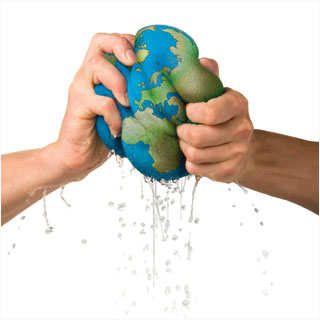
According to the statistics provided by UN Water in 2013, 85% of the world population lives in driest part of the planet. 783 million people don’t have access to clean water and 2.5 billion don’t have access to sanitation. 6 to 8 million people every year as a result of water diseases.[1] UN Water unfolds that only 358 million people out of 783 million without clean water are in Africa. These numbers are warning to future generations. Global population growth threatens the world even more on water issues rather than on food and energy recourses. I’m again back to Hans Rosling’s ideas of overpopulation myth. With expected increases in population by 2030, food production is expected to increase and renewable energy will rise to overlap with population growth. But, what about water? How we are going to increase water? Probably, by limiting today’s consumption levels. However, another problem is climate change, warming in artic zones result in disappearing of drinkable water resources in oceans.
Rather than focusing on the issue that whether the Earth has enough water recourses to future generations or not, I want to shed light on the topic “human right to water”. World Economic Forum announced in January 2015 that, the water crisis is number one global risk based on its impact to society as the number of people dying of diseases related with water (as result of no access to water or anti sanitation problems) increases annually. [2] Only diarrhea caused by inadequate access to clean water and safe sanitation kills approximately 842,000 people globally every year. This is about 2,300 people a day. Lack of access to water and sanitation is mainly in developing countries or underdeveloped countries. West doesn’t seem to suffer from water problems and rich nations consumption level is quite high not to leave water to poor nations. All these problems lead to one issue: if rich people has enough water for consumption and sanitation, then this is the right of others too.
At some points, I agree that it is reasonable to have right to water, as many child mortality, death rates, health problems are related with sanitation and lack of water. According to Andrea Gerlak and Margaret Wild, Mexico has the right to water in its constitution and South Africa was one of the earliest countries to have this right. Interestingly, ‘human right to water’ is appeared only in developing countries where people suffer from lack of water and anti-sanitation, and it doesn’t have clear consumption levels and exact limitations. So, questions are those “how far the right is global?” and “how limited it is?”. Firstly, in order to balance the consumption level worldwide, ‘human right to water’ should be not only in African constitutions but in western constitutions too. Yes, of course Westerners don’t have problem with water.
it’s government’s responsibility to provide its citizens with water, energy and other needs. And the right should cover not only developing African countries but Asian countries too.
According to the European Convention on Human Rights, article 8, 9 manifests that everyone has right to freedom of religion and right to freedom of expression, but one’s right ends when another person’s right starts. There are certain limitations to exercise one’s rights in order to balance the equity in the society. Thus, probably, “human right to water” should be global right in order to balance the consumption of water in the rich countries where water are wasted, and to carry the same level and quality of water to the poor countries. Furthermore, ‘human right to water’ shouldn’t mean free and limitless water to everyone. It can lead to chaos as it did in Johnson vs. Durban case. Second, some limitations to water consumption can also help to reduce level of wasted water in western countries too. Hence, with certain limitations and worldwide recognition, human right to water can put the number of global risk behind and go even down of this list.
By: Zeynab Abdullayeva
[1] http://www.unwater.org/water-cooperation-2013/water-cooperation/facts-and-figures/en/ [2] http://water.org/water-crisis/water-facts/water/
By: Zeynab Abdullaeva
 Oval Useful news from Azerbaijan and Caucasus
Oval Useful news from Azerbaijan and Caucasus